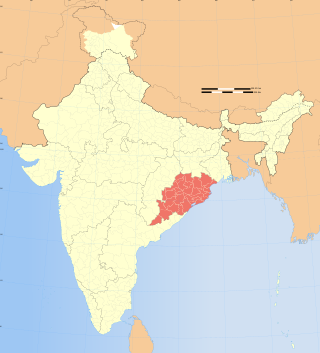The expression rice Christian is a derogatory slur used to describe someone who has formally converted to Christianity for material benefits rather than for religious reasons. [1] Merriam-Webster dictionary defines it as "a convert to Christianity who accepts baptism not on the basis of personal conviction but out of a desire for food, medical services, or other benefits". [2]
Similarly, in India, the term rice bag or rice bag convert is used as a derogatory slur targeting Christians, alleging that the target has converted to Christianity for a bag of rice. [3] [4] [5] The term is often used by right-wing Hindutva groups in India. [6] [7]
Concerns have been expressed both by Christian missionaries and by those opposed to Christian missions that people in these situations are only nominally converting to Christianity in order to receive charity or material advancements. [8] [ better source needed ]
One of the earliest examples of this concept in English appeared in 1689 with the writings of William Dampier when he wrote regarding the French priests' effort to convert people of Tonkin that "alms of rice have converted more than their preaching." [9]
This term and the topic were very extensively written about by Thomas Hale, Jr. He introduced the topic in his first 1986 book Don't Let the Goats Eat the Loquat Trees and spoke and taught on best practices in missions summarizing his work in his 1995 book On Being a Missionary. The term has also been used pejoratively to describe conversions by missionaries who exploit poverty and famine, where food and other allurements are given in exchange for conversion. [10] In Christian Witness in a Multi-Religious World: Recommendations for Conduct, a document issued by the World Council of Churches in 2011, one of the points raised states "If Christians engage in inappropriate methods of exercising mission by resorting to deception and coercive means, they betray the gospel and may cause suffering to others." Principles 4 and 5 of this document outline that "Acts of service, such as providing education, health care, relief services and acts of justice and advocacy are an integral part of witnessing to the gospel. The exploitation of situations of poverty and need has no place in Christian outreach. Christians should denounce and refrain from offering all forms of allurements, including financial incentives and rewards, in their acts of service...as they carry out these ministries, fully respecting human dignity and ensuring that the vulnerability of people and their need for healing are not exploited." [11] These admonitions are seen as to prevent false conversions which produce such so-called rice Christians. [12] [13]
Hindutva is a political ideology encompassing the cultural justification of Hindu nationalism and the belief in establishing Hindu hegemony within India. The political ideology was formulated by Vinayak Damodar Savarkar in 1922. It is used by the Rashtriya Swayamsevak Sangh (RSS), the Vishva Hindu Parishad (VHP), the Bharatiya Janata Party (BJP) and other organisations, collectively called the Sangh Parivar.

Proselytism is the policy of attempting to convert people's religious or political beliefs. Carrying out attempts to instill beliefs can be called proselytization.
A number of religious groups, particularly Christians and Muslims, are involved in proselytization of Jews: attempts to recruit or "missionize" Jews. In response, some Jewish groups have formed counter-missionary organizations to discourage missionary and messianic groups such as Jews for Jesus from using practices that they say are deceptive.
A Christian mission is an organized effort to carry on evangelism or other activities, such as educational or hospital work, in the name of the Christian faith. Missions involve sending individuals and groups across boundaries, most commonly geographical boundaries. Sometimes individuals are sent and are called missionaries, and historically may have been based in mission stations. When groups are sent, they are often called mission teams and they undertake mission trips. There are a few different kinds of mission trips: short-term, long-term, relational and those that simply help people in need. Some people choose to dedicate their whole lives to mission.
Graham Stuart Staines was an Australian Christian missionary, who along with his two sons, Philip and Timothy, was burnt to death in India by members of the Hindu nationalist group, Bajrang Dal. In 2003, Bajrang Dal activist Dara Singh was convicted of leading the murderers and was sentenced to life in prison.
The term Dalit Christian or Christian Dalit is used to describe those who have converted to Christianity from other forms of religion in the Indian subcontinent, and are still categorised as Dalits in Hindu, Christian, Muslim, and Sikh societies in South Asia. Hindu Dalits are sometimes referred to as Harijans. About 90% of Pakistani Christians are Dalits from the Chuhra caste and at least 9% of Indian Christians are Dalits, categorised thus by the greater societal practices in various parts of the Indian subcontinent.
Freedom of religion in India is a fundamental right guaranteed by Article 25-28 of the Constitution of India. Modern India came into existence in 1947 and the Indian constitution's preamble was amended in 1976 to state that India is a secular state. Supreme Court of India ruled that India was already a secular state from the time it adopted its constitution, what actually was done through this amendment is to state explicitly what was earlier contained implicitly under article 25 to 28. Every citizen of India has a right to practice and promote their religion peacefully. However, there have been numerous incidents of religious intolerance that resulted in riots and violence, notably, the 1984 Anti-Sikh Massacre in Delhi, 1990 Exodus of Kashmiri Hindus from Kashmir, 1992-93 Bombay Riots in Mumbai, the 2008 Anti-Christian riots in Odisha. Some perpetrators of the 1984 Anti-Sikh Massacre in Delhi have not been brought to justice despite widespread condemnation.

Christianity is India's third-largest religion with about 26 million adherents, making up 2.3 percent of the population as of the 2011 census. The written records of Saint Thomas Christians mention that Christianity was introduced to the Indian subcontinent by Thomas the Apostle, who sailed to the Malabar region in 52 AD.
Redemptoris missio, subtitled On the permanent validity of the Church's missionary mandate, is an encyclical by Pope John Paul II published on 7 December 1990. The release coincided with the twenty-fifth anniversary of Vatican II's Decree on the Church's Missionary Activity, Ad gentes. It is devoted to the subject of "the urgency of missionary activity" and in it the pope wished "to invite the Church to renew her missionary commitment."
The caste system among South Asian Christians often reflects stratification by sect, location, and the caste of their predecessors. There exists evidence to show that Christian individuals have mobility within their respective castes. But, in some cases, social inertia caused by their old traditions and biases against other castes remain, causing caste system to persist among South Asian Christians, to some extent. Christian priests, nuns, Dalits and similar groups are found in India, Pakistan, Bangladesh, and Nepal.

Christianity is, according to the 2011 census, the fifth most practiced religion in Nepal, with 375,699 adherents, or 1.4% of the population. Many informed observers have estimated that there are at least 1 million Nepali Christians. According to some Christian groups, there may be as many as 3 million Christians in Nepal, constituting up to 10% of the country's population. A report by Gordon Conwell Theological Seminary identified the Nepali church the fastest growing in the world. The vast majority of Nepali Christians are evangelical Protestants ; there is also a small Catholic population of roughly 10,000.

Anti-Christian violence in India is religiously motivated violence against Christians in India. Human Rights Watch has classified violence against Christians in India as a tactic used by the right-wing Sangh Parivar organizations to encourage and exploit communal violence in furtherance of their political ends. The acts of violence include arson of churches, conversion of Christians by force, physical violence, sexual assaults, murders, rapes, and the destruction of Christian schools, colleges, and cemeteries.

Christianity in Asia has its roots in the very inception of Christianity, which originated from the life and teachings of Jesus in 1st-century Roman Judea. Christianity then spread through the missionary work of his apostles, first in the Levant and taking roots in the major cities such as Jerusalem and Antioch. According to tradition, further eastward expansion occurred via the preaching of Thomas the Apostle, who established Christianity in the Parthian Empire (Iran) and India. The very First Ecumenical Council was held in the city of Nicaea in Asia Minor (325). The first nations to adopt Christianity as a state religion were Armenia in 301 and Georgia in 327. By the 4th century, Christianity became the dominant religion in all Asian provinces of the Eastern Roman Empire.

Religious violence in Odisha consists of civil unrest and riots in the remote forest region surrounding the Kandhamal district in the western parts of the Indian state of Odisha.
Christians form 1.3% of the total population numbering around 350,000 in Punjab, India as per as the 2011 census. According to many media reports, demographic experts and Christian groups, there may be up to 2.77 million Christians living in Punjab, constituting up to 15% of the state population, although the authenticity of that claim is still not known. Many converts to Christianity keep their original identity to exploit the benefits of reservation. John Lowrie and William Reed were missionaries who went there in 1834. The Diocese of Amritsar of the Church of North India has its seat in Punjab as does the Roman Catholic diocese of Jalandhar. There are thousands of settlements with a Christian congregation. From 1881 to 1891 the Christian population of the then still united Punjab increased rapidly.
Joseph D'souza is an Indian bishop, missionary, and Christian and Dalit rights activist. As of 2018, he was International President of the Dignity Freedom Network (DFN), President of the All India Christian Council (AICC), and CEO of Operation Mobilisation - India with is not affiliated with Operation Mobilisation, International. On 30 August 2014, he was consecrated as Archbishop of the Good Shepherd Church of India, and associated ministries.
Ghar Wapsi is the programme of religious conversion to Hinduism from Islam, Christianity, and other religions in India conducted by Indian Hindu nationalist organisations Vishva Hindu Parishad (VHP), Rashtriya Swayamsevak Sangh (RSS) and their allies. The term owes to the Hindu nationalist ideology that all people of India are ancestrally Hindu and, hence, conversion to Hinduism is one of "returning home" to their ancestral roots.
The 2021 anti-Christian violence in Karnataka refers to the series violence against Christians by right wing Hindutva groups in the Indian state of Karnataka in 2021. The attacks increased after September 2021 when leaders of Bharatiya Janata Party (BJP) declared of an "anti-conversion bill" in the state to check religious conversions. The violence again intensified over the Christmas period when right-wing mobs disrupted Christmas celebrations. The Human rights organisation, People's Union for Civil Liberties (PUCL) documented 39 violent incidents against Christians in Karnataka from January to November 2021, all carried out by Hindutva organizations such as the Rashtriya Swayamsevak Sangh (RSS), Hindu Jagrana Vedike, Bajrang Dal, and Banjara Nigama. The violence included physical assaults, sexual assaults against women, church vandalism, filming the attacks and later circulating the videos to celebrate.
Anti-conversion laws, or anti-conversion legislations, are a set of judicial rules that restrict or prohibit conversion of faith (proselytism) from one religion to another. It is a federal law in countries such as Algeria, Bhutan, Myanmar, and Nepal. They are meant to prevent forced conversion of individuals to different religions, and offences are punishable by imprisonment and fine. Sri Lanka has prepared its legislation, but has not yet enacted it. Pakistan had introduced the Prohibition of Forced Conversion Bill 2021 that was rejected by its Ministry of Religious Affairs in 2021.